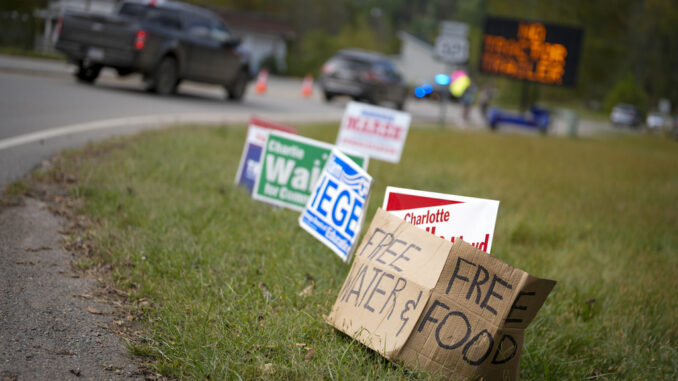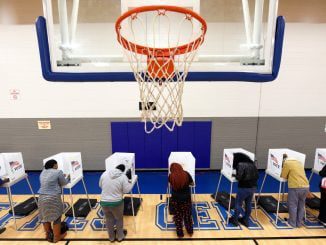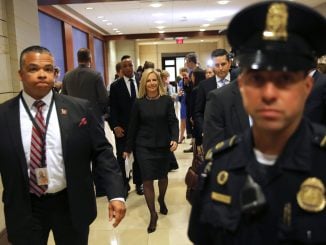
RALEIGH — The North Carolina State Board of Elections unanimously passed a resolution directed at facilitating voting for certain counties impacted by Hurricane Helene during a meeting on Oct. 7.
“We may have to bring voting to the people,” said NCSBE Executive Director Karren Brinson Bell at the onset of the meeting.
Member Stacey “Four” Eggers underscored the importance for local county board directors to coordinate with state emergency management services to get the supplies and support they need.
The North Carolina State Board of Elections’ (NCSBE) resolution will cover voters in 13 counties: Ashe, Avery, Buncombe, Haywood, Henderson, Madison, McDowell, Mitchell, Polk, Rutherford, Transylvania, Watauga and Yancey.
The board’s resolution only covers 13 of the 28 counties that include tribal lands on its Helene landing page.
“These counties report that not all of their scheduled early voting sites or election day voting sites will be available due to damage from the storm, inaccessibility, the site’s current use for disaster response, or the likely unavailability of sufficient staff,” the resolution states.
The remaining counties and tribal lands under the federal disaster declaration are Alexander, Alleghany, Burke, Caldwell, Catawba, Cherokee (Tribal Area), Clay, Cleveland, Gaston, Graham (Tribal Area), Jackson, Lincoln, Macon, Swain (Tribal Area) and Wilkes.
The U.S. Postal Service is still listing at least six ZIP codes in the disaster zone where mail delivery still is not possible. Duke Energy’s power outage map shows at least 121,000 customers still without power.
When asked during a media call later the same day about voters outside of the 13 counties, Brinson Bell said the counties in the resolution are the ones who appear most impacted by Hurricane Helene and the others are not being considered because “they are very much back online” and operating.
Changes to early voting plans
The 13 identified counties are “authorized to modify their early voting plans by bipartisan majority vote without a requirement for the State Board to approve those modifications.”
Each county board has to create a resolution supporting that the modifications they have voted on they feel are needed due to Helene’s impacted and must provide a copy of that resolution to the NCSBE.
Modifications can include changing or adding sites or removing sites that are unusable, adding or reducing days that any site is open within the established early voting period, as well as extending or reducing hours that any site is open on any days within the established early voting period.
There are 40 early voting sites in the 13 counties covered by the resolution. Brinson Bell said early voting may “look different” in some affected areas, but it will commence Oct. 17 in all 100 counties as planned.
When asked if temporary voting sites might be used and how secure they might be, Brinson Bell said those type of sites are typically National Guard tents like the ones they used during Hurricane Dorian.
Election Day polling places
The resolution says any changes to precincts and Election Day polling places have to be as minimal as possible, stating “the county board shall strive to maintain voting access as close to existing voting locations as possible and should resort to establishing a voting site outside of a precinct only as a last resort.”
Poll worker recruitment and assignment
The provision allows for boards to appoint election officials who are registered voters for early voting and Election Day voting sites from other counties. The appointment of election officials for Election Day voting sites “without regard to the official’s precinct of residence”
County boards are given authority to make appointments of emergency Election Day assistants and assign them to a precinct as well as reassigning poll workers to other precincts where they may be needed.
Absentee ballot processing
The resolution allows voters to request and receive an absentee ballot in person at their county board of elections office up until Nov. 4.
Near relatives or guardians of a voter can pick up and deliver a ballot to the voter as well as drop off completed ballots to county boards of election, the NCSBE or Election Day polling places. Absentee ballots must be received by these entities by 7:30 p.m. on Election Day.
Absentee voting for affected voters
Voters displaced from their home at which they are registered within the 13 counties in the resolution can return their absentee ballots to the county they may be residing in. This process is designed to help people vote even if something has disrupted normal voting in their home county while still making sure their votes are counted in the right place.
The county office that receives these out-of-county ballots will date stamp the ballots and send them to the voter’s correct county before the votes are counted. The county boards will keep a record of the chain of custody of these types of ballots.
The board discussed and amended the resolution to include reporting of the number of absentee ballots returned to counties other than the county in which the voter was registered. The county board will compile a weekly count report of those incidents to be provided to the NCSBE.
Multipartisan assistance teams (MATs)
These will be expanded to cover shelters and locations in the disaster area.
Per the NCSBE, a multipartisan assistance team, or “MAT,” is a group with multiple party affiliations appointed by a county board of elections that assist with mail-in absentee voting and other services for voters that need additional help, such as individuals in hospitals, shelters and nursing homes.
MATs can provide voters with registration services, absentee ballot requests, serving as an absentee ballot witness, sealing the ballot and mailing it.
In limited cases, a MAT may help the voter in marking a ballot, but the voter’s selection is “kept in strict confidence.”
“These measures were put in place to ensure the victims of Helene can vote in the upcoming election and provide election officials in the hardest hit areas the tools they need to conduct a secure election under extraordinarily difficult conditions,” Brinson Bell said in a post-meeting press release. “Just like the people of western North Carolina, election officials are resilient. We are determined to get the job done for our neighbors and friends in western North Carolina.”



